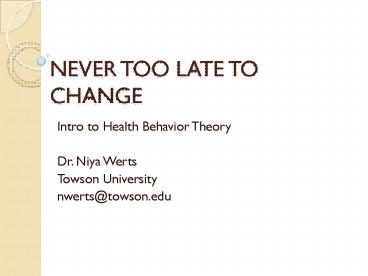NEVER TOO LATE TO CHANGE - PowerPoint PPT Presentation
1 / 20
Title:
NEVER TOO LATE TO CHANGE
Description:
'People will only try to do what they think they can do and wont try what they think they can't. ... Verbal Persuasion. Somatic and Emotional. States ... – PowerPoint PPT presentation
Number of Views:162
Avg rating:3.0/5.0
Title: NEVER TOO LATE TO CHANGE
1
NEVER TOO LATE TO CHANGE
- Intro to Health Behavior Theory
- Dr. Niya Werts
- Towson University
- nwerts_at_towson.edu
2
- PIE SLICES
3
Self Efficacy
- People will only try to do what they think they
can do and wont try what they think they cant. - Mastery Experience
- Vicarious Experience
- Verbal Persuasion
- Somatic and Emotional
- States
4
Staples Model of Self Efficacy
Source http//jcmc.indiana.edu/vol3/issue4/sta
ples1.gif
5
HEALTH BELIEF MODEL (HBM)
- HBM is what is known as a VALUE EXPECTANCY THEORY
- The subjective value of the
- outcome.
- The subjective probability
- or expectation that an action
- will achieve the outcome.
6
HBM KEY CONSTRUCTS
- People will take action to prevent, screen for or
control a condition of ill-health IF - They believe they are SUSCEPTIBLE to the
conditions - They believe the condition and the consequences
are SEVERE. - They perceive that taking some action X has some
BENEFIT in terms of reducing the threat, as well
as other benefits. - They perceive that the BARRIERS to taking the
action are low. - The are CUES TO ACTION or triggers.
- The person believes that he/she can do the
behavior that will produce the desired outcome
(SELF EFFICACY).
7
THEORY OF PLANNED BEHAVIOR
- A persons perception of how much they can
control their behavior is combined with
intention, attitude and norms to determine or
predict behavior.
8
TPB
Source http//forest.wisc.edu/facstaff/rickenba
ch/TPB20graphic.jpg
9
STAGE MODELS
10
Trans Theoretical Model
Source http//www.wipp.nhs.uk/tools_scf
p/img/participants_hbook_activity2_model.gif
11
THE STAGES OF TTM
- Pre-contemplation No intent to take
action/change behavior. - Contemplation Intention to change, maybe within
the next six months. - Preparation Intention to take action in the
immediate future, say in the next month. - Action A specific, relevant modification in
behavior is made. - Maintenance Striving to maintain change, prevent
relapse. - Termination Individual no longer succumbs to
temptation and has self-efficacy about
maintenance.
12
THE PRECAUTION-ADOP STAGES
- Unaware of issue
- Unengaged by issue
- Deciding about acting this decision could be 4
or 5 - Decision not to act
- Decision to act
- Acting
- Maintenance
- Most difficult those in stage 1 or 4. Model
argues that people usually pass thru these stages
in sequence though there may be some exceptions.
13
THE WHOLE PIE
14
What is an ecological model?
- Ecological Models are comprehensive health
promotion models that are multifaceted, concerned
with environmental change, behavior, and policy
that help individuals make healthy choices in
their daily lives. - Credit to Dr. Theresa Jackson at Towson
University. This slide is part of her excellent
Multi Level Approaches to Health Behavior and
Health Education presentation
15
Social Ecological Model
16
SOCIAL NETWORKS
17
SOCIAL NETWORK QUALITIES
- Reciprocity
- Intensity
- Complexity
- Geographic density/dispersion
- Cliques and boundaries
18
Four types of social support
- Informational Advice, suggestions, and
information - Emotional Expressions of empathy, love, trust,
and caring - Instrumental Tangible aid and service
- Appraisal Information that is useful for
self-evaluation
Credit to Dr. Theresa Jackson at Towson
University. This slide is part of her excellent
Multi Level Approaches to Health Behavior and
Health Education presentation
19
SOCIAL MARKETING
- Social marketing campaigns are built around the
FOUR Ps - -- Product The behavior, program,
technology - -- Price Cost of adoption
- -- Place Where product available
- -- Promotion How to promote the first
three
20
COMMUNITY AND ORGANIZATIONAL CHANGE
- In many situations, change in the health behavior
of individuals first requires change in the
community itself, in norms, laws, physical
conditions, systems, or organizations relevant to
the situation.































